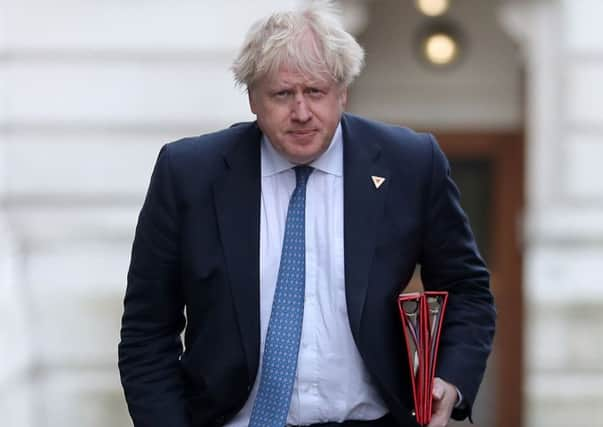Euan McColm: Putin's useful idiots on both sides of the House


Russian officials, aggressively fighting claims – and evidence – the federation was behind a chemical weapon attack in Salisbury that left former spy Sergei Skripal and his daughter Yulia fighting for their lives, last week sought to undermine faith in British intelligence on the matter by pointing to the “lies by Tony Blair” over the Iraq war.
Those who have been following events since the poisoning of the Skripals on 4 March will remember that, days later, Labour leader Jeremy Corbyn stood up in the House of Commons to share a similar view; he said the “saga” over weapons of mass destruction before the Iraq war undermined the government’s position that Russia was definitely to blame.
Advertisement
Hide AdAdvertisement
Hide AdCorbyn’s spokesman later reiterated his doubt over Russian guilt saying ministers’ use of intelligence on Iraq’s weapons programmes in 2003 meant accepting the government’s position now was “problematic”.
Russian officials, having been told by the international Organisation for the Prohibition of Chemical Weapons that they would not be involved in the testing programme and investigation sparked by the attack, echoed the words of the leader of the opposition, saying British intelligence cannot be trusted when it comes to the Salisbury attack.
Even a cursory glance at social media confirms that this is a popular line, especially among those who support Corbyn. At its most distasteful, the conspiracy they espouse not only rubbishes intelligence on Salisbury but adds that the government has been using the issue to distract attention from Brexit.
The Russians do not, of course, have to persuade anyone that some other state was behind the attempt to kill the Skripals: they simply have to cast doubt over their own involvement.
In this mission, they are ably served by Corbyn and others, including Foreign Secretary Boris Johnson.
Last month Johnson – incredibly, still discussed as a potential future Prime Minister despite the mountain of evidence of his complete unsuitability for that position – made some ill- considered remarks about the source of the nerve agent, Novichok, used in the attack. He seemed to suggest scientists had confirmed to him Russia’s responsibility.
But, last Tuesday, Gary Aitkenhead, chief executive of the Defence Science and Technology Laboratory at Porton Down, said that although the substance used in the attack had been identified as Novichok, a type of chemical weapon developed in the former Soviet Union and Russia, it was not clear whether it had been made in Russia. Creation of the substance was, he added, probably only in the capabilities of a state actor.
None of this says Russia was not behind the attack but it certainly helps sow doubt.
Advertisement
Hide AdAdvertisement
Hide AdWith typical but unnecessary bravado, Johnson made highflown claims which have now returned to damage not only his reputation but that of the British security services. (The fact that he has not been sacked throws into sharp focus the weakness of Prime Minister Theresa May.)
After Johnson’s blunder, Labour backbencher Chris Williamson – slavish in his adoration of his leader – appeared on Kremlin propaganda channel RT (that’s the station on which shadow chancellor John McDonnell said Labour MPs should not appear) to dance like a Kremlin-trained monkey.
Williamson told the channel – funded by President Vladimir Putin’s government in order to spread Russian propaganda – that Johnson had used the “terrible incident” as a smokescreen, diverting attention away from issues surrounding the UK’s impending departure from the EU. This was the stuff of dreams for those conspiracists who’d already divined a Brexit factor in this whole ugly business.
Williamson added that Corbyn had been right to urge caution before international tensions were raised.
Iraq, of course, hangs heavy over this situation. A long-running political narrative among those who opposed military action 15 years ago that those who were in favour were acting in bad faith has had its effect. Trust in intelligence agencies is damaged and, when it comes to foreign policy, this government, like the two which preceded it, is paralysed.
But flawed intelligence on Iraq 15 years ago does not mean that the intelligence services are wrong on the matter of who poisoned the Skripals.
Putin once said that traitors to Russia would “kick the bucket”. Sergei Skripal, an agent who turned, surely fits Putin’s description. Russia’s boorish responses – from mocking Tweets by embassy staff to a more sinister threat from Russia’s ambassador to the United Nations, Vasily Nebenzya, that Britain will “be sorry” for “playing with fire” – suggest Moscow is rather enjoying the whole shebang.
And why wouldn’t it be? This is playing out perfectly for Russia.
Advertisement
Hide AdAdvertisement
Hide AdTwo people were targeted by a Russian-developed chemical and we’re focused on picking apart the UK’s case.
Scepticism is healthy, cynicism is not. The view that Russia was not involved and that, perhaps, the UK had something to do with the attack requires an especially cynical worldview.
The attempted murders of Sergei and Yulia Skripal were not “convenient” for the government, they were not a useful distraction from local elections or Brexit, they were outrages most likely perpetrated by – as Gary Aitkenhead of the Porton Down lab said – a state actor.
If not Russia, then which state actor? Which nation with an appalling track record on human rights, led by an oligarch-enabling former spy whose opponents have a habit of dying, would want to kill the Skripals? All roads point to Russia.
Ironically, the sort of “debate” we’re now having in the UK would not take place in Russia. There, any public criticism of the state carries with it considerable risks.
Johnson and Corbyn are, in their own ways, Russia’s useful idiots, helping fuel a narrative that could have been dictated by Putin himself. They have provided Russia with room for manoeuvre. More importantly, they have undermined the United Kingdom, behaviour which should render them unfit for the positions they hold.